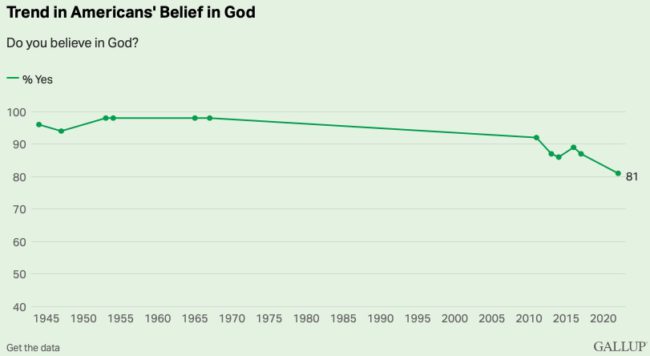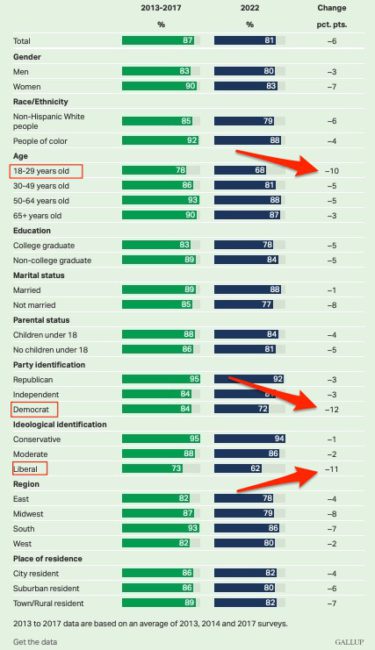
The saga of a decline is US religion has a new data point. On June 17, 2022, Gallup released the results of a new poll. You can find the details on their website under the title “Belief in God in U.S. Dips to 81%, a New Low“.
This specific survey was rather focused, and asked these questions …
- Do you believe in God?
- Which comes closest to your view about God — God hears your prayers, God hears your prayers and can intervene on your behalf, or God does neither of these?
In other words, this is not looking at how people might practice a belief, but instead just asks if they have a belief that there is a God, and is also asking if the god they believes in will listen and help them.
Who does this cover?
You might, for example, have people who identify as “None” when asked about religion because they don’t tick the “Catholic” or “Baptist” boxes, but deep down they do still consider themselves to be spiritual and believe that there is a higher power.
In other words, this bypasses boxing people in with a religious identify and instead asks directly if they think there is a God.
81% said Yes.
Gallup don’t consciously explain why the numbers are the way they are. The best you will get from them are the details of exactly how they gathered the data and when they gathered the data. Interestingly enough they do perhaps sub-consciously give us their thoughts on why by categorising the posting, not under “belief”, nor under “religion”, but instead under “politics”.
I’ll share my thoughts on why a bit later. First, let’s take a closer look at their numbers.
Do You Believe in God?
As mentioned above, 81% said “Yes”. They note that 17% said “No – they do not believe that there is a God”.
I assume the other 2% were simply unsure either way.
While the vast majority did say “yes”, the discovery that 17% said “nope” is a huge surprise. They have been asking this question since 1944. Up until as recently as 2011 as many as 90% were saying “yes”. Then in 2013 it dropped to 87% and stayed there. Now we have this further 6% drop.
Here is the timeline …

What Gallup has also done is to slice up the data.
Doing this reveals the groups of people who are changing their minds between 2017 and now…

Three categories leap out …
- 18-29 year olds
- Democrats
- Liberals
As a contrast, if you are Conservative and married, it is highly probable that your views regarding God have not changed.
Prayer – a small Surprise
Gallup do also have data on a follow up question regarding prayer and how effective people believe it to be.
There we find a small surprise that illustrates something.
Of those that attend religious services weekly …
- 74% – believe that God hears prayers and intervenes
- 23% – believe that God hears prayers but does not intervene
- 2% – do not believe that God hears prayers or intervenes
- 1% – do not believe in God
Yes … 1% who attend a religious service weekly don’t believe in God, and a further 2% don’t believe God pays any attention to them.
1% sounds small, but overall it represents rather a lot of people across the nation.
The point is this – life is complicated.
People often do things such as attending a weekly religious service for other reasons. They might not be religious at all, and simply do so because they have a partner or a parent they love, so they go along for that reason.
OK, so back on topic. We should perhaps ponder a bit over why there has been a sudden drop of 6 percentage points in the belief that there is a God.
Why is it like this?
If you asked somebody who is deeply religious, then the guidance you will most probably get is an assertion that we live in dark troubled times. Many have turned away from godliness. These are the last days, etc…
That would be a belief based answer.
Putting all that to one side, what the data does reveal is that religion very much plays a part in the current political divide.
To be a tad more specific, this …
- Political Conservatives now very much include religion as part of their identity
- Political Liberals generally don’t include religion as part of their identity
What results from this is social pressure – those that identify as conservative mostly do believe in God (94%), and those that identify as liberal have no group pressure to believe in God, so only 62% do.
Either way, majority’s do believe, it is only a minority that don’t.
Yes, but why the sudden drop?
Religion, as it manifests within Conservative ranks sends a rather brutal message. Here are some obvious examples …
- Dishonest – very vocal support for Trumps big lie by many evangelicals
- Intolerance – The gay community is under a vicious and sustained attack by many religious Conservatives
… and I’m only scratching the surface with those examples.
In other words, the very best argument ever deployed against the religious Conservatives comes, not from their opponents, but rather from within their own ranks. The actions and rhetoric from some has become so utterly repugnant that it creates a strong pressure for total rejection of both them and their beliefs.
Does God exist?
It is simply a poll. At best it gives you a rough insight into what people believe when the poll was conducted and how the statistics gathered compare to previous polls.
Reality is not a democracy.
The things that are true remain true even if nobody believes them.
The things that are false remain false, even if everybody believes them.
In other words, the poll tells us nothing about the actual reality or not of God, but instead gives us an insight into what people believe.
The term “God” is also rather vague. The poll asked “Do you believe in God?” without defining what the word “God” means. If you asked people to define it, then you will get a vast diversity of conflicting answers.
Knowing that 81% of people believe in God, does not really tell you all that much.
Belief in a God is also not really a binary choice. Obviously it is either true that there is some form of a God or it is not true, but people tend to hold a specific conclusion on this question with a degree of confidence. You will probably find that all those who said “yes” or “no” would also admit to having doubts regarding their conclusion.
What we do learn is this …
- There has been a 6% drop in those answering “no” to that question
- Those answering “no” are mostly liberals and young
In other words, that 6% drop is not the end-game, but instead is part of an ongoing trend that will no doubt continue.
With religious Conservatives becoming more and more extreme, less democratic, and far more autocratic, that results in a social pressure that continues to push many away from that identity. Additionally, over time as the older more set in their ways generation passes away, the up and coming generation that is far less anchored within traditional religious beliefs will inevitably grow in number.
Given the utterly obnoxious behaviour of many religious Conservatives, that can only ever be one thing – a very good trend that is truly welcomed.
Some additional data points
- Gallup: Only a third of Americans (36%) say they have a “great deal” or “quite a lot” of confidence in organised religion. The rest don’t.
- General Social Survey: Only a minority are sure God exists, a majority have doubts.
- Gallup: Only 47% belong to a house of worship, a majority don’t
The US Religious landscape is transitioning to something rather different.
